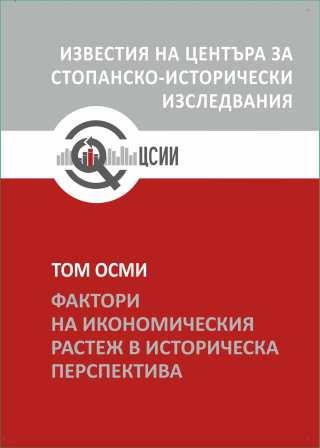ИКОНОМИЧЕСКАТА ПОЛИТИКА В БЪЛГАРИЯ В ГОДИНИТЕ НА ПРЕХОД И ЧЛЕНСТВО В ЕВРОПЕЙСКИЯ СЪЮЗ
ECONOMIC POLICY IN THE YEARS OF ECONOMIC TRANSITION AND THE EUROPEAN UNION MEMBERSHIP IN BULGARIA
Author(s): Dimitar Zlatinov, Stoyan ShalamanovSubject(s): History, Economy, National Economy, Economic history, History of ideas, Social history, Recent History (1900 till today), Socio-Economic Research
Published by: Център за стопанско-исторически изследвания
Keywords: Currency Board Arrangements; fiscal policy; monetary policy; economic transition; EU membership
Summary/Abstract: The article examines the economic background that led to the introduction of the Currency Board Arrangements in Bulgaria since 1997 and the fiscal and monetary policies implemented before and after this. We focus on the transformation processes and challenges of the transition to a market economy, which largely predetermine some structural weaknesses of the Bulgarian economy to this day. We trace the institutional features of Currency Board Arrangements and the basic principles of its design, which requires coordination of fiscal and monetary policy measures in Bulgaria. We highlight the channels of quasi-monetary policy that the government possibly can follow through the changes of the government's deposit in the Central bank. This policy feature imposes constraints on the fiscal policy in Bulgaria, which should not put the sustainability of the Currency Board Arrangements at risk. The article also highlights the changes in the national government policy framework resulting from the European Union membership and outlines its capacity to mitigate negative cyclical developments. The atypicality of macroeconomic policy under the Currency Board Arrangements in Bulgaria is highlighted, with a clear tendency to follow a counter-cyclical and stabilisation management strategy. Our analysis shows that the effects of macroeconomic policy depend much more on the overall economic environment in Bulgaria than on the traditional transmission channels of macroeconomic policy. Following the Currency Board Arrangements in Bulgaria, the Bulgarian National Bank has limited possibilities to directly influence the price stability, while on the fiscal policy side there are more channels to influence inflation, which reinforces the notion of the government's ability to conduct quasi-monetary policy. The Central bank actions are much more related to risks stemming from the financial sector itself than they are reactive to changes in the economic environment. In such a situation, the effectiveness of macroeconomic policy can be sought if it facilitates the implementation of structural reforms that have the greatest potential to affect the overall economic environment.
Journal: Известия на Центъра за стопанско-исторически изследвания
- Issue Year: VIII/2023
- Issue No: 1
- Page Range: 222-235
- Page Count: 14
- Language: Bulgarian

